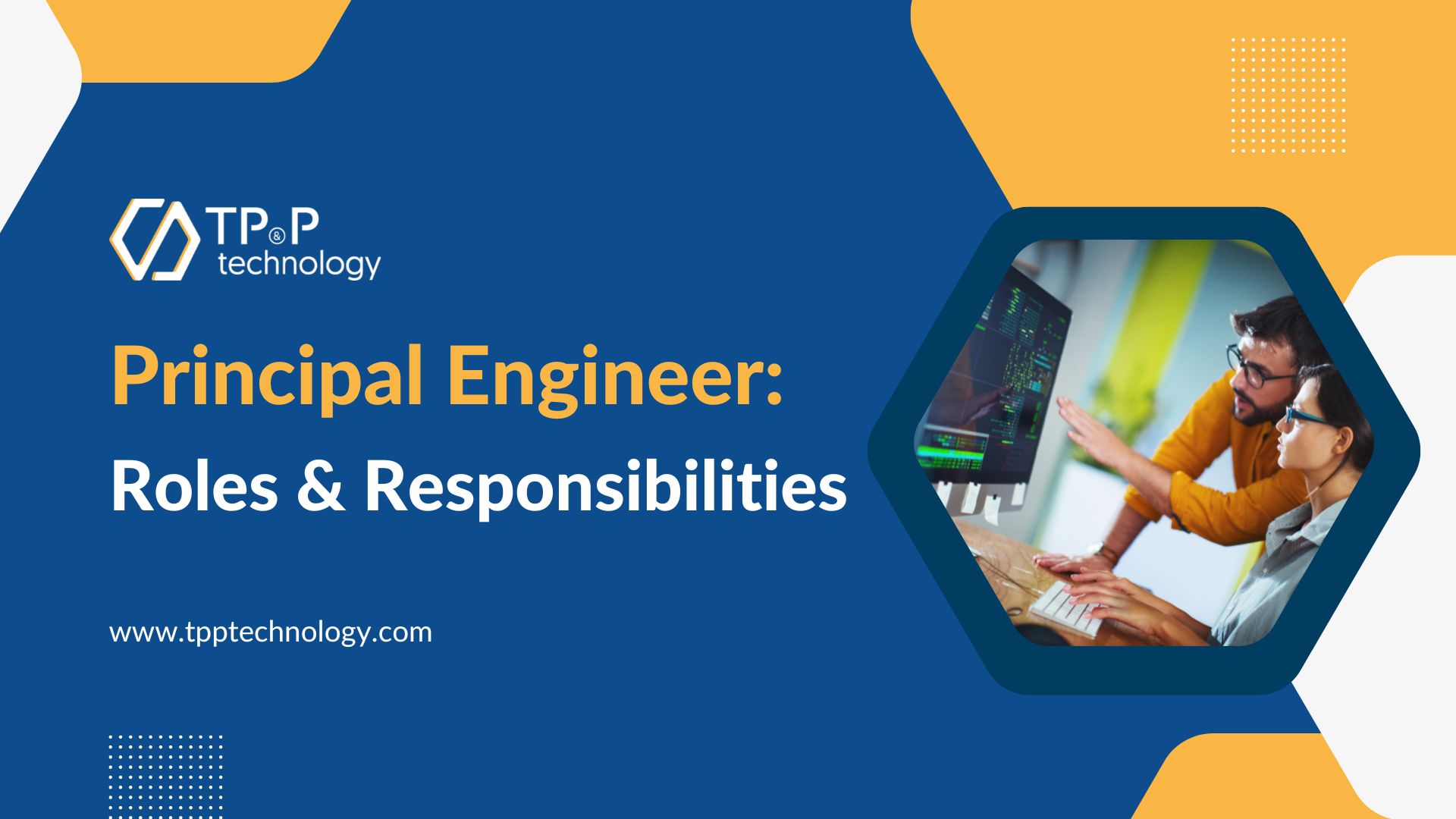
Software Development
31 Jan, 2023
Principal Engineer: Roles & Responsibilities
After several years of experience as a software engineer, you can begin to assume more leadership responsibilities. You are in charge of overseeing your team and ensuring they are on track, in addition to your typical engineering duties. You can advance your engineering career by becoming a principal software engineer by taking on these additional responsibilities.In this article, we'll look at what makes a great principal engineer, as well as their key roles and responsibilities. We'll also discuss the differences between a senior engineer and a principal engineer, and the skills that a successful principal engineer should have.
What is a principal engineer?
A principal engineer is a highly skilled engineering professional with many years of experience. After working as engineers in a specific field, they manage projects and employees. Unlike other engineers, the role of the principal (software) engineer is one of leadership, guiding staff to ensure an engineering team completes projects on time and within budget.
These engineering experts are in charge of overseeing engineering and software development projects' research, development, and design. Principal engineers are also in charge of growing teams and leading the personnel carrying out these technical engineering projects.
Principal engineer roles and responsibilities
Principal engineers or developers are the highest-ranking engineers, ranking above software engineers, and staff engineers; as a result, they must be well-rounded and experienced.
The roles and responsibilities of principal engineers include, but are not limited to
- Developing and delivering technical standards and guidance in all software design and development activities.
- Help with the maintenance and upgrades of existing software applications.
- Provide design feedback and technical recommendations
- Assist with the entire software development life cycle (SDLC)
- Make certain that all projects are of high quality.
- Mentoring and training junior software engineers.
- Assist in the analysis and resolution of application problems.
- Create effective and applicable technical solutions that meet the needs and requirements of the business.
- Make suggestions for new technologies that will improve productivity.
- Collaborate with others to plan, prioritise, and complete project tasks.
- Take part in risk assessments and risk-mitigation activities.
- Attend meetings on a regular basis to discuss projects, issues, and ideas.
- Participate in technical audits and ensure that recommendations are followed.
- Make business presentations to management.
- Develop test cases, procedures, and plans in collaboration with QA.
Principal engineer skills
Excellent multitasking skills
One of the most important skills for principal engineers is the ability to multitask. Principal engineers are not only in charge of overseeing multiple projects at the same time, but they are also in charge of guiding and mentoring other engineers within the organization while managing budgets and timelines.
Analytics
Principal engineers are constantly working to improve the systems that are used to achieve goals and solve problems as they arise. A principal engineer must be analytical in order to analyze a technical situation and find the best solution.
Communication
Principal engineers must be excellent communicators, both verbally and in writing. Every day, they communicate with team members and clients. Principal engineers must be able to clearly and concisely communicate their ideas and thoughts, as well as any tasks they are delegating, for projects to run smoothly.
People management
Being a principal engineer also necessitates the ability to manage a team of people. They must be able to provide direction, answer questions, delegate work, and collaborate to set and achieve team goals.
Project management
When overseeing an entire project, there are always a lot of balls in the air, so a principal engineer must be able to juggle all of the moving parts. For example, they must monitor whether their team is staying within budget, meeting goals, and meeting deadlines.
Subject expertise
It goes without saying that a principal engineer should be a recognized expert in their engineering field. After all, they are in charge of the entire project, including research, development, and design. If anyone has a question about the project, they should contact the principal engineer.
Principal engineer vs. senior engineer
Both principal and senior engineers are required to have many years of experience and and in-depth knowledge in their field. However, while both are high-level engineering positions, the titles are not interchangeable.
Principal engineers are generally higher on the hierarchy than senior engineers. Although they both have a lot of experience and are at the top of their field, principal engineers act like leaders in their field and tend to handle more complex and advanced projects.
A senior engineer usually has a wide range of responsibilities, which may include:
- Analyze customer needs to find appropriate solutions to complex technical problems
- Create technical diagrams, flowcharts, formulas, and other written documents to support your project
- Advice junior engineers on projects in their areas of expertise
- Conduct research on new technologies and products to recommend improvements to current processes
- Planning the design of new products or systems according to customer wishes
- Research existing technologies to see how they could be applied in new ways to solve problems
- Review existing products or designs to ensure compliance with company standards, regulations, and policies
- Prepare proposals for new projects, identify potential problems and propose solutions
- Estimate project costs and design requirements and evaluate the results
How to become a principal engineer?
Many people believe that the only distinction between software engineers, architects, and principal engineers is one of semantics. For smaller businesses with limited resources, a single person may fill these roles. However, there are distinctions between these engineers in larger companies.
These are the levels:
Level 1: Software Engineer
Level 2: Senior Engineer
Level 3: Staff Engineer
Level 4: Principal Engineer
Level 5: Distinguish Engineer or Fellow
Principal engineers, as you can see, are at a higher level than senior engineers. They are more concerned with the company as a whole. Senior engineers and other technical experts focus their efforts on finding solutions to existing problems.
On the other hand, principal engineers concentrate on developing solutions that will benefit the company. They are in charge of team development and the technical aspects of a software engineering projects. In short, their responsibilities are focused on team management and determining the company's technical direction.
To become a principal engineer, follow these steps:
1. Determine your discipline
Because engineers typically specialize in one area of the industry, there are various types of principal engineers. When deciding on a major, you can select one of the following disciplines: Aerospace engineering, Biomedical engineering, Chemical engineering, Computer engineering, Electrical engineering, etc.
2. Get an education
To become a principal engineer, you must first obtain a bachelor's degree in a relevant field of study. While a master's or doctorate degree is not required for the job, you may choose to pursue one. Earning additional education can demonstrate to employers that you are a true expert in your field. You can more effectively lead projects and solve problems if you specialize in engineering knowledge.
3. Gain experience
Most principal engineers have had a decade of engineering experience to take on this leadership role. Throughout your career, begin to develop skills related to this position. Likewise, it is assumed that the supply will gradually take on more responsibility at work. This way you can continue to grow in your career and finally prove to your company that you are ready for a promotion.
4. Create application materials
Even if you're applying for a position as a principal engineer at your current company, you'll need a resume and cover letter. These application materials must demonstrate your high level of knowledge and expertise. Throughout these documents, emphasize your analytical, communication, and leadership abilities. Include your relevant accomplishments to demonstrate your ability to successfully lead a project.
Principal engineers bear a lot of responsibility. They are not only in charge of project management, timelines, and budgets, but they are also in charge of mentoring and guiding aspiring engineers. While becoming a principal engineer is a lengthy process that requires extensive experience and industry knowledge, it is ultimately a coveted and rewarding profession that many people seek.



